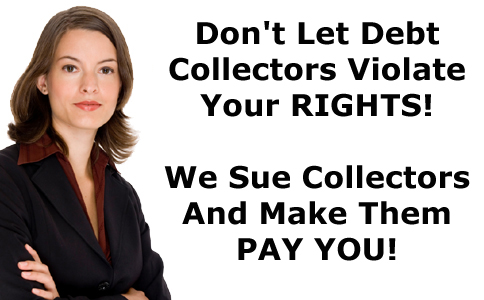Sue A Collector For Debt Collection Harassment
- Are you receiving harassing, abusive, or threatening phone calls or letters?
- Did a debt collector advise you that this communication is from a debt collector?
- Did a debt collector leave you a voice message that someone besides you overheard?
- Have your friends or employer received phone calls or letters about your debt?
- Does a debt you disputed or settled still appear on your credit report?
Receive up to $1000.00 For Statutory or More For Actual Damages!
Get $500 - $1500 per call for illegal Robocalls or text messages
If debt collectors are violating your consumer rights through the FDCPA, you have the right to sue and recover up to $1000.00 in statutory damages and possibly more for actual damages!
State and federal fair debt laws prevent debt collectors from using harassing, misleading, dishonest and unfair debt collection practices.
These laws provide that victims of debt collector abuse can recover cash compensation from debt collectors, and require the collectors to pay all legal fees.
Debt collectors routinely violate federal consumer protection laws in order to attempt to collect on a debt. They know that the average consumer doesn't understand the laws that are in place to protect them from unlawful collection practices, nor do they believe that even if you did understand that you know how to enforce your rights.
Fair Debt Collection Practices Act (FDCPA)
The FDCPA bars all forms of unfair, abusive and deceptive collection practices. While the Federal statute provides a laundry list of potential violations, this list is not exclusive. The statute also provides a general prohibition on any form of deception, abuse, or unfair treatment. In spite of federal and state law, debt collectors continue to abuse consumers in order to unfairly pressure them into paying debts. These abuse tactics are often intended to scare or intimidate consumers, sometime with threats of violence or arrest.
Other collectors pile on illegal interest or fees to make the debt seem larger that it actually is. In some instances, these debts are time-barred, discharged in bankruptcy, or not owed for other reasons.
Common FDCPA Violations
Here are some common FDCPA violations perpetrated by debt collectors:
- Contacting a debtor who is represented by an attorney.
- Failing to warn a debtor that the communication is from a debt collector and that any information obtained will be used to collect a debt.
- Failing to warn on all subsequent communications that they are from a debt collector.
- Calling the debtor an unreasonable number of times daily or after they have been instructed to stop calling.
- Using profane, foul, or obscene language.
- Making racial, religious, or sexual slurs.
- Yelling or screaming at the debtor.
- Engaging in name calling.
- Falsely threatening a lawsuit.
- Falsely threatening to ruin a debtor’s credit.
Bankruptcy Discharge Violations
Has a collection agency or a collection law firm continued to contact you and demand payment on your debts that were discharged in bankruptcy? Filing bankruptcy protects you from such collection attempts by collection agencies and collection law firms. If your rights were violated, they may owe you money. If so, contact us immediately!
Credit Report Violations
Is there a false or disputed item showing on your credit report? Was your credit report accessed by an unauthorized individual or company? If so, contact us immediately!
Abusive practices are not acceptable in attempting to recover a debt, regardless of whether you believe you owe the debt or not. Debt collectors are required by law to respect the dignity of consumers.
Here's a general rule of thumb: If your mother would be upset at you for treating other people the way that you were treated by the debt collector, then that conduct probably violates the FDCPA.
To see more FDCPA violation examples CLICK HERE


